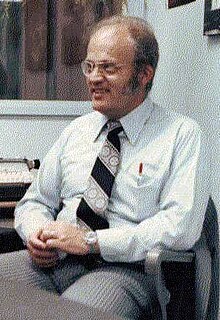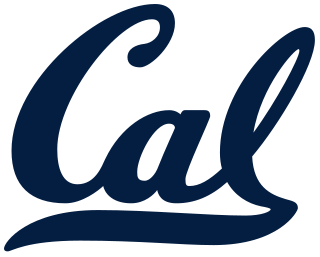Related Research Articles

The NCAA Men's Water Polo Championship is an annual tournament to determine the national champion of NCAA men's collegiate water polo. Beginning in 1969, it has been held every year except 2020, when it was postponed to March 2021 because of the COVID-19 pandemic. With a limited number of NCAA water polo programs at the national level, all men's teams, whether from Division I, Division II, or Division III, are eligible to compete each year. The tournament was expanded from a four-team bracket in 2013 by adding two play-in games that are contested by the bottom four seeds, effectively creating a six-team bracket with a first-round bye for the top two teams.
The Oski Yell is the University of California Berkeley spirit yell from which Cal's mascot, Oski the Bear, derives his name. Although Oski appeared in 1941, the yell was first performed around the turn of the 20th century. The yell's origins are uncertain, although the University of Illinois originated a similar yell in 1899. Another early version is credited to Vince Wirtz, who led a similar cheer beginning in the 1920s at football games for Hamilton, Ontario teams.

Oski the Bear (Oski) is the official mascot of the University of California, Berkeley ("Cal"), representing the California Golden Bears. Named after the Oski Yell, he made his debut during Cal Football's season-opener against St. Mary's College on September 27, 1941. Prior to his debut, live bears were used as Cal mascots.

The 250-member UCLA Bruin Marching Band, known as The Solid Gold Sound, represents the university at major athletic and extracurricular events. During the fall marching season, the band performs at the Rose Bowl for UCLA Bruin home football games. Pregame shows by the band aim to build crowd energy and enthusiasm with traditional UCLA songs like "Strike Up the Band for UCLA", "Bruin Warriors", and "The Mighty Bruins". Throughout the game, the band performs custom-arranged rock and pop songs, as well as the traditional fight songs and cheers of the university. The UCLA Varsity Band appears at basketball games and other athletic contests in Pauley Pavilion. In 2018, the Bruin Marching Band was featured on the Muse album "Simulation Theory" performing the Super Deluxe version of the song "Pressure."

The University of California Marching Band, usually shortened to Cal Band, is the marching band for the University of California, Berkeley. While the Cal Band is student-run, it is administered under the auspices of the university and represents Cal at sporting events and social gatherings. The name of the band is "The University of California Band" by the constitution, but is typically called "The University of California Marching Band" or "The Cal Band". When the band marches out of Memorial Stadium's North Tunnel for football pre-games, it is referred to as "The Pacesetter of College Marching Bands, the Pride of California".

"Mighty Bruins" is a fight song of University of California, Los Angeles sports teams. Composed by Academy Award-winning composer Bill Conti, the song was commissioned by the UCLA Alumni Association on its fiftieth anniversary. It debuted in 1984 at the football game against Stanford University, with the school marching band conducted by Conti himself.
"Rover" is a song traditionally sung at the end of athletic contest victories by fans of the University of California Los Angeles. It is a parody of the song "I'm Looking Over a Four Leaf Clover". The UCLA Band arrangement opens with "There'll Be a Hot Time in the Old Town Tonight". Following the opening, the band then plays the chorus to "I'm Looking Over a Four Leaf Clover". The band and students sing the lyrics, then the band plays the chorus again.
"Victory for MSU", formerly "MSU Fight Song", is the official fight song of Michigan State University, US. MSU's fight song was created in early 1915, when MSU was known as Michigan Agricultural College (M.A.C.). An MSU cheerleader, Francis Irving Lankey, along with lyricist Arthur Sayles, created the song. With several changes noted below, the school has used the same song ever since. The MSU Fight Song is played at all university sporting events and is frequently sung by students and alumni.
"Hail to the Hills of Westwood" is the school song or alma mater of the University of California, Los Angeles. It was written by Jeane Margaret Emerson a 1929 graduate of UCLA, and adopted by the school in 1960. The current arrangement performed by the UCLA Marching Band was written by band member Dwayne S. Milburn for the 1985 football season.
"Fight for California" is the official fight song of the University of California, Berkeley. The tune is a march and is from the "trio" or final strain of the "Lights Out March" written by Earl Elleson McCoy in 1906. The lyrics were written by Robert N. Fitch of the class of 1909.
"Big C" is a fight song of the University of California, Berkeley. It was composed in 1913 by Harold P. Williams, with lyrics by Norman Loyall McLaren. It was written to commemorate the construction of the large concrete "C" in 1905 on the "rugged Eastern foothills" of the Berkeley campus. The song was the winning entry in the Daily Californian school song competition in 1913. Arrangements of the tune are used by other schools in the University of California system.
"Sons of California" is a fight song of the University of California, Berkeley, as well as the University of California, Davis. It was composed by Clinton "Brick" Morse in 1896. Although it was originally an unpopular song among students because of its slow and solemn hymn, the Cal Band began performing a more lively version in the 1930s. From then on, "Sons of California" would remain one of the best known songs at the University.
The California Indian Song was a school fight song of the University of California, Berkeley, written by Harold Bingham in 1907 celebrating the rivalry between the California Golden Bears and the Stanford Cardinal. At that time, the mascot of Stanford University was the Stanford Indian, but the mascot was abandoned in 1972 because it was considered offensive. The California Indian Song was also abandoned, but has recently found a new fan base among Golden Bears fans.
"Strike Up the Band" is a 1927 song composed by George Gershwin, with lyrics by Ira Gershwin with the collaboration of Millie Raush. It was written for the 1927 musical Strike Up the Band, where it formed part of a satire on war and militaristic music. Although the musical was not successful, the instrumental version of the song, titled the "March from Strike Up the Band", has become quite well known. The song was also used in the Judy Garland-Mickey Rooney 1940 film Strike Up the Band.
Robert Orlando Briggs was the longtime director of the University of California Marching Band. He was the fourth full-time director since the founding of the band in 1891.
"California Drinking Song" is a spirit song from the University of California, Berkeley. The first appearances of this song are traced to 1939. Both the UC Men's Octet and the University of California Marching Band perform it as part of their repertoire. It is a blend of other songs, including "The Goddamned Dutch".
"The core element of “California Drinking Song” is “Rambled,” otherwise known as “California.” The tune is based on the song “Oh, Didn’t He Ramble,” by Cole and Johnson. The words were changed to what we know as “For California, for California, The hills send back the cry, We’re out to do or die,” and first appeared in printed form in 1906." ..."Titled “One More Drink for the Four of Us,” this part of “California Drinking Song” is a traditional song of conviviality, sung throughout the United States ."

The University of California Jazz Ensembles, also known as the UC Jazz Ensembles, UC Jazz, or UCJE, is the student jazz organization founded in 1967 on the University of California, Berkeley, campus. Founded in 1967, it comprises one or more big bands, numerous jazz combos, a vocal jazz ensemble, an alumni big band, and instructional classes. With a mission statement to foster a community for the performance, study, and promotion of jazz at U.C. Berkeley, its Wednesday Night big band provides free concerts every Thursday noon on Lower Sproul Plaza, its various units perform throughout the San Francisco Bay Area including area high schools, travel to collegiate jazz festivals, and perform overseas, and for many years it sponsored the annual Pacific Coast Jazz Festival. It also provides master classes by its instructors and clinics by prominent guest artists. It has nurtured numerous musicians who have become professional jazz musicians and educators. UC Jazz Ensembles is one of three groups, with the Cal (marching) Band and UC Choral Ensembles, forming Student Musical Activities (SMA), a department within Cal Performances on the U.C. Berkeley campus. Its members are primarily U.C. Berkeley undergraduate and graduate students, representing many academic disciplines.

David W. Tucker (1929–2003) was a jazz trombonist, music educator, composer of band and orchestral music, record producer, and marching band arranger, most renowned as the director of the University of California Jazz Ensembles from 1969 until 1985. Under his direction, the organization expanded to become the largest musical organization on the campus of the University of California, Berkeley, had an international reputation resulting from foreign tours, and sponsored the Pacific Coast Collegiate Jazz Festival. Numerous student members of the organization have become renowned jazz musicians, composers, and music educators.
"Hail to California" is an alma mater song used throughout the University of California system. "Hail to California" is traditionally played before every Cal basketball home game, is a common song at California Golden Bears football games, and is sung at convocations and matriculations at UCSB and UC Davis.

The California–UCLA football rivalry is an American college football rivalry between the California Golden Bears football team of the University of California, Berkeley and UCLA Bruins football team of the University of California, Los Angeles.
References
- ↑ UCLA History: Songs UCLA Alumni Association (Retrieved June 2017)
- 1 2 "FUN FINAL FOUR FACTS: UCLA BRUINS". ESPN The Magazine. Retrieved May 26, 2012.
UCLA's fight song, "Sons of Westwood," was organized by Kelley James to be performed by three marching bands at once: UCLA, UC-Davis, and Cal.
